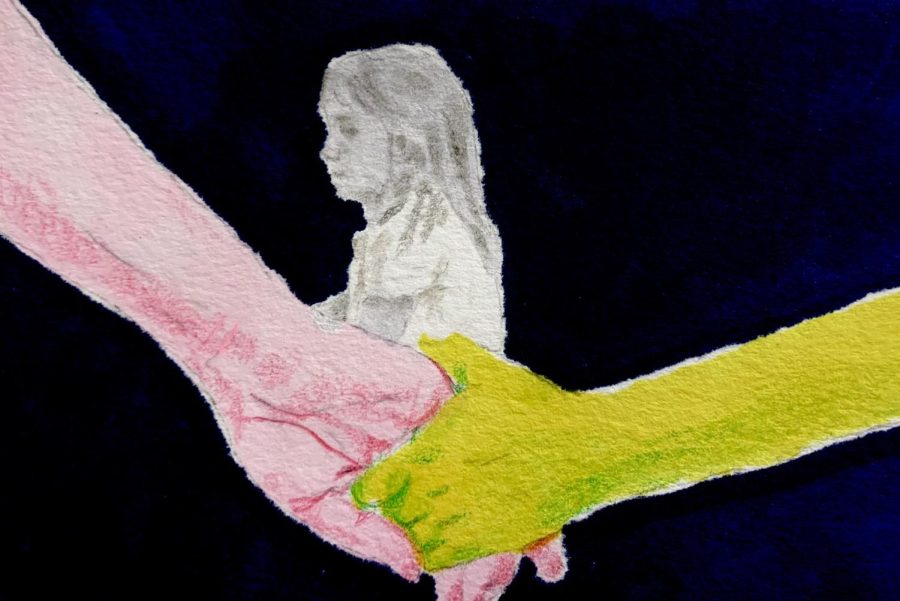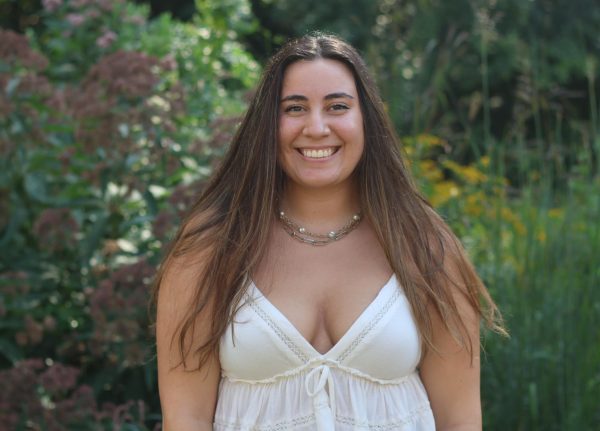Opinion: Oldest child syndrome
Credit: Alyssa Ao
WSPN’s Katya Luzarraga discusses the expectations of being an older sibling and how they’ve affected various aspects of her life.
December 8, 2022
Being an older sister isn’t what I thought it would be. From the first moment I met my little brother, his body enveloped in the safety of his pastel blue blanket. I knew that I was no longer my parent’s only daughter, but I was also his older sister. I was the one he would forever look up to as his role model, an example of something to strive for. I didn’t sign up for these expectations, yet I’m plagued with them every single day of my life.
As an eight-year-old, I never realized the gravity of being an older sister. It meant that I had to look out for him, make sure he was okay. I put my needs to the side and grew up for him, leaving my childhood behind.
My parents always tell me that I am their “golden child,” the perfect daughter who thinks about everyone’s feelings before her own. The one who is strong-willed and determined, and who is a role model to others. In reality, they see what I want them to see: the perfect exterior crafted through years of crippling expectations and unachievable goals.
The pressures of being the first child can be referred to as “oldest child syndrome.” Your birth order affects characteristics of your personality. Oldest children are responsible for looking out for their siblings and being ambitious overachievers.
Everything that parents worry about is placed on the shoulders of the oldest child, while the younger siblings get off the hook simply because they weren’t born first.
I was my family’s first daughter, niece and granddaughter. The expectations and aspirations bestowed on me by everyone in my life were immense. I saw the way my parents beamed at me when I got good grades and was recognized by my teachers. However, I also saw their disappointment when they would get calls home regarding my behavioral issues. These phone calls emphasized the difficulties of achieving perfection. My parents held me to a standard that my brother never has been held to.
I watch as my parents give him everything he wants, and I question the hypocrisy of their actions. As a child, I had to earn their love and attention through hard work because they expected the most from me. Yet, my brother waltzed into their hearts with little to no expectations from them. It wasn’t fair. I wanted the life of the youngest child.
I don’t have an alternative path. I have a legacy to carry on. I am the next generation of hardworking Vasilchenko women.
My grandmother, grandfather, mother and aunt all came to this country after the Chernobyl disaster of 1986, in which nuclear waste polluted Ukraine, leaving almost 4,000 people dead. Ukraine no longer held the promise of safety and a future that America had. Because of this, my grandparents left their life behind in pursuit of the “American Dream” for their daughters. My grandmother raised two daughters all while overcoming language barriers and providing for her family in a new country. Following in the footsteps of my grandmother, my mother and aunt overcame their own obstacles and persevered through hardships, eventually graduating from Boston University and Yale University, respectively.
Through my achievements and activities, my parents placed their dreams on me because I was an opportunity for them to live out their glory days.
Dreams that were never mine began to weigh me down every single day. I never would’ve become a tennis player if my father hadn’t shoved a tennis racket in my hand since before I could walk, as a bonding activity between us. I never would’ve danced for over a decade of my life if my mother had just been able to pursue dancing in her own life. I saw the yearning in their eyes of unfulfilled dreams. Since they couldn’t do it, I wanted and needed to.
I was an impressionable little girl who wanted to see my parents happy. I didn’t know any better. However, this pressing effort created an identity crisis within myself about who I really was, and if I was doing these activities for myself or for them. To this day, I always do what I think will make my parents happy, and it immensely impacts my sense of independence and individuality.
My parents didn’t have a choice to work hard. They couldn’t afford to be lazy or act entitled because their families had immigrated to the United States for better opportunities. They worked tirelessly to create a future for themselves, always putting into perspective the sacrifices their own parents had made. Because of their struggles, they believe that I don’t work hard enough for my grades. On the contrary, I practically kill myself every single day and night, tears streaming down my face, furious that I can’t fulfill impossible expectations.
Never having an older sibling to look up to made me constantly wish for someone to magically appear and tell me if I was doing the right things in life. I vowed to myself that I would be my brother’s guide, regardless of the toll it took on me.
My brother reminds me of my young self in so many ways. I want to protect him. He deserves to feel the way that I never did, protected from the suffocating demands of our parents.
The expectations placed on the oldest sibling never stops. At times, I wish I was an only child. However, not signing up for these expectations nine years ago have resulted in some of the most rewarding moments of my life.





![Last Wednesday, the Wayland School Committee gathered to discuss a number of topics regarding the health curriculum and Innovation Career Pathway course. Another large topic of conversation was the ways to potentially mitigate distracting cell phone usage. "These [phones] are going to distract your learning and social relationships," Superintendent David Fleishman said. "That's concrete right there."](https://waylandstudentpress.com/wp-content/uploads/2025/06/Screenshot-2025-06-04-at-9.49.31 PM-1200x886.png)



























![Troy Hoyt finishes the Boston Marathon, running for the Hoyt Foundation. T. Hoyt is the son of Hoyt Foundation CEO Russ Hoyt.
“[Running a marathon] might seem like a big thing, when it’s presented to you at first, but if you break it up and just keep telling yourself, “Yes, you can,” you can start chipping away at it. And before you know it, you’ll be running the whole 26 miles, and you won’t even think twice about it.” T. Hoyt said.](https://waylandstudentpress.com/wp-content/uploads/2025/04/C36E8761-1CBB-452E-9DF2-543EF7B1095E_1_105_c.jpeg)














































